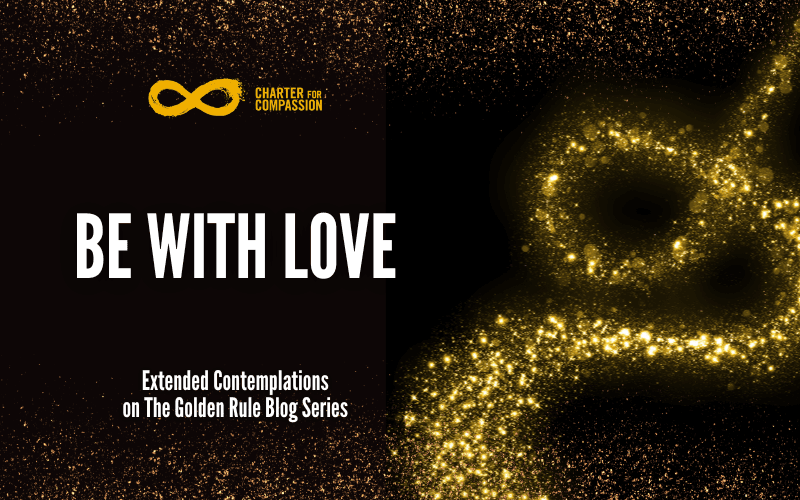
If the Golden Rule is about being loving towards self and others, how can I possibly keep doing this on a continuous basis?
How can I keep producing all this love and giving it away to others?
I can't be everything for everybody. And if I keep giving away all my love, how can there be any left for myself?
If I keep giving of myself, I'll soon become totally drained and burned out. Being too empathetic results in burnout and an inability to do anything. No one can survive being too empathetic. No one can just keep giving.
The Golden Rule, compassion, kindness, loving – this all sounds like a wonderful high ideal, but there's no way it can possibly work. No one can possibly be like this all the time. How could it possibly work? What's the secret?
The secret is in understanding self and Love.
In the previous blog, I shared my realization that Love flows ubiquitously throughout the Universe.
Love is everywhere and everything and Love is dynamic.
All we need to do is to go with the flow, go with the flow of Love.
The catch, though, is that this is something that is easier said than done.
I previously suggested that you might want to experiment with thinking, saying, feeling: "May the Love be with you."
Even better, though, there is also a significant corollary to this: "May you be with Love."And you can personalize this for yourself: "May I be with Love."
In other words: "May you go with the flow of Love" and "May I go with the flow of Love."
Okay, this sounds kind of nice, but what does that mean? How do I do that?
Well, Love flows through us all the time. Or at least it tries to. Love is constantly available to flow through the innate essence of our being. This flow of Love is an inherent aspect of our essential self. All that is needed to accommodate this flow of Love is an open heart and an open mind. The open mind gives rise to a willingness to go with the flow. A narrow mind greatly restricts the flow, a closed mind blocks the flow of Love.
Unfortunately, our attachment and devotion to our material self and to our other acquired aspects of being tend to limit the openness of our mind and block this flow, or at least greatly reduce this flow of Love. And our attachments arise from fear: fear that we aren't enough; fear that we don't have enough; fear that we won't be able to get enough; fear that we won't be able to keep what we have; fear of the unknown; fears of countless things that we imagine.
And all of these fears arise because we don't actually know who and what we really are. We have a strong tendency to believe that we are our material selves, which also often includes all the material things and experiences we can acquire. We live our lives as though we believe that the more material stuff and experiences we can acquire the more successful we will be, the better we will be, and the more worthy we will be.
We are spiritual beings having a material experience. And our material experience has almost totally taken over our image and understanding of who and what we are. Our spiritual beings are ignored, neglected, discounted, and even denied.
We may participate in some sort of spiritual life, whether individually or with a group, a community, a tradition, or a religion. But much of this is on the level of memes, nice sayings or chants, or prayers that are comforting or even inspiring, and perhaps also some actions intended to help others who are in need of food or clothing, shelter, or education. Some of this probably even helps us feel better about ourselves as we go about living our privileged lives, all while still wondering if we have enough, or if we'll be able to keep what we have, or perhaps get even more.
But, do we know how to really listen within to our inner voice of inspiration and guidance? Do we practice doing this in our lives? Do we put this into practical action through the way we live? Is this a top priority in your life?
Remember that this isn't just about being compassionate towards others; this isn't just about treating others with respect. This is first and foremost about treating yourself with respect and being compassionate towards yourself, loving yourself. If you are unable to fully embrace and love yourself, you will get in your own way as you attempt to embrace and love others.
Working at opening your mind to the inner inspiration and guidance of your heart is a significant part of what inner work or spiritual work is all about. There are many traditions that have arisen through time that provide insights, teachings, and practices to help facilitate such work on one's self. There is no one traditional path that provides the best way to undertake such inner work, yet they can all be helpful.
Each of us is different, so this is why there are so many paths, so many ways to travel the inner journey. The best way to travel for one person may not work well, or at all, for another. One way to view inner work is that it helps one get to know and understand one's self, and then discover how to bring the small self, the acquired aspects of self, into harmonious relationship with the essence of one's innate Self.
Because we each have our own acquired personality, it is most helpful to study teachings and work with practices that are most appropriate for our personality, and our own personal issues. It can be challenging, even impossible, for a person to figure out which teachings and practices are most appropriate for them to work with. We, unfortunately, are often attracted to things that will only exacerbate our existing personal issues. This is why it is usually best to find an experienced spiritual or inner work guide to work with. An experienced and trained guide can be highly adept at seeing a student's inherent potentials and also the hindrances that need to be worked on before Love can begin to flow more freely so innate potentials can be nourished to grow and blossom as beautifully as possible. Although some general guidelines can be given, this is why the best specific practices cannot be appropriately assigned in some "how to do it" blogs or books, or videos.
There are countless useful practices available which can be drawn from. Meditation is one commonly used practice, although there are many different practices that are called meditation and they work in very different ways, and not every way will be appropriate for everyone, or necessarily be the best for you, yet the "right" way for you will bring you amazing results. The same can be said for prayer, for chanting, for sound practices, for movement practices, for breath practices, for yoga, for smiling, hugging, and countless variations on all of these categories.
One significant insight regarding doing anything was provided by G.I. Gurdjieff who taught that we have three aspects or three centers of being: physical (moving); emotional (feeling); intellectual (thinking). There are practices that basically involve only one of these centers, while others might involve two centers, and yet others will simultaneously involve all three of these centers. The greatest benefit will be gained through doing practices – or anything in life – that simultaneously involve all three centers because this provides a more holistic and full engagement with whatever one is doing. Thus, while sitting meditation might bring one significant benefit, moving meditation will likely bring even greater benefit, and incorporating a strong emotional component in one's practice will tend to enhance the benefits one gain to an even greater degree. This same principle can be applied to a whole variety of practices.
While one can work on one's self alone, and ultimately we must each travel our own individual inner path, it can also be very helpful to travel in the company of like-minded companions, kindred spirits. This is one reason there are many different churches, mosques, synagogues, temples, meditation or prayer groups, etc. where one can find others to travel with. And through such associations, it is possible that one might find a guide to work with who can help make one's inner work a bit easier, more efficient, and more productive.
An important caution to consider, though, is that a significant aspect of such inner work is the necessity to remove all hindrances, obstacles to the flow of Love through one's self. Associating with any particular organization, such as a church, mosque, synagogue, etc., usually comes with a set of beliefs that are part of the teachings. Beliefs can be helpful in various ways during different stages of one's inner work journey. Ultimately, though, a belief is an attachment to whatever one chooses to believe in, and, as Buddhist teachings clearly point out, any attachment eventually becomes a hindrance to making further progress on one's path. So, while a professed belief may be useful for a while, it eventually needs to be let go of so one can continue one's journey towards clearing and opening the way for Love to freely flow through one's being. Only this will allow and enable you to truly be with the flow of Love.
If you think back to the beginning of this blog, you'll find that I actually suggested some practices that you could try. You could say to yourself or to others: "May you be with Love." or "May you go with the flow of Love. "You could perhaps make it a practice to say this as a parting comment. Or you could, from time to time, say just to yourself: "May I be with Love" and "May I go with the flow of Love. "Simple practices such as this can be powerful for changing one's mindset so that the mind is no longer so "set," which means no longer so self-limiting. Instead, you can work towards expanding your mind, which is part of opening your mind. These are simple practices in developing a greater degree of personal freedom – simple practices in removing hindrances to the flow of Love.
With Love,
Carl Karasti


